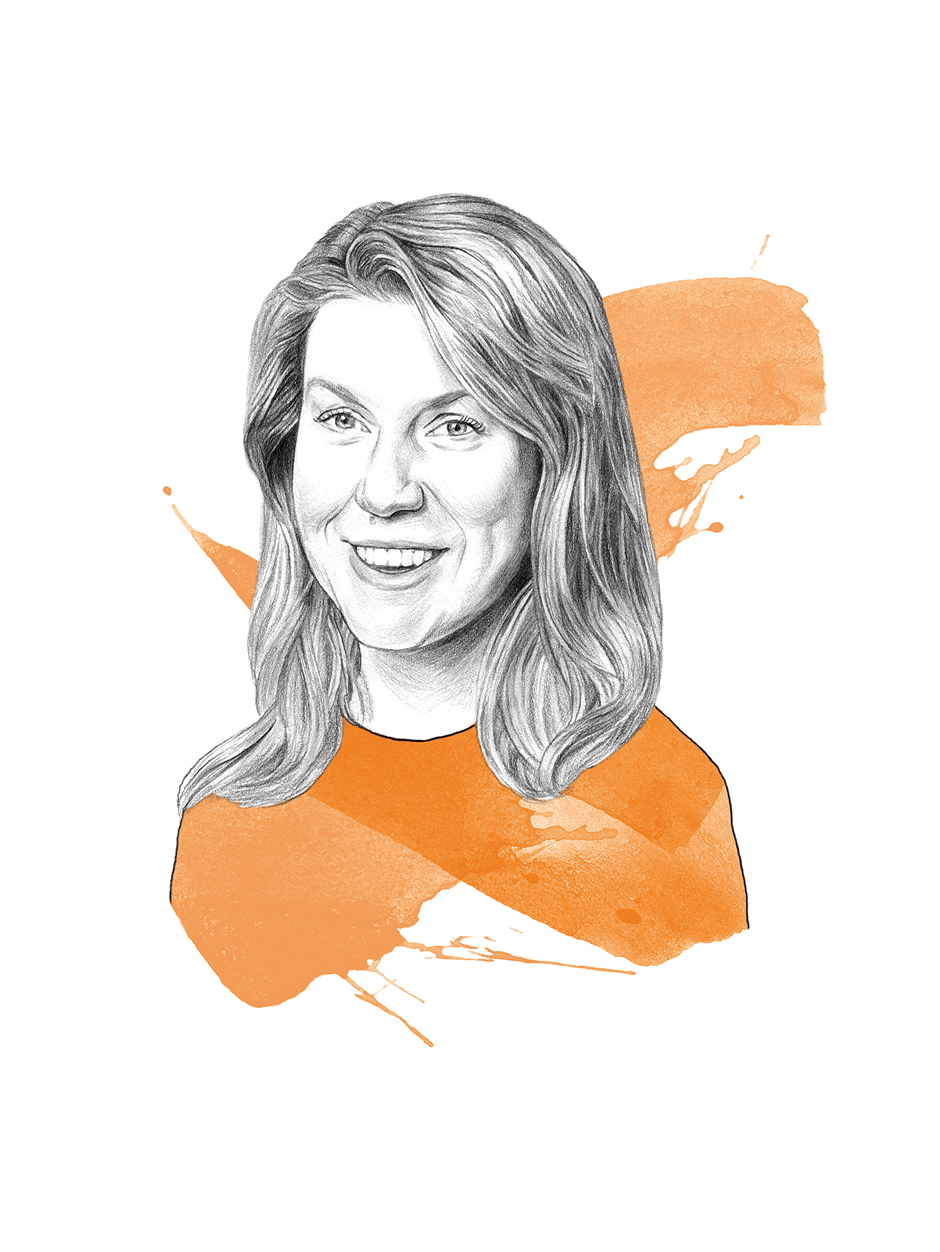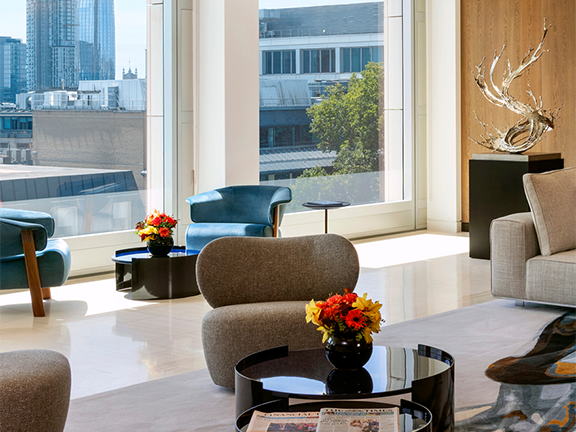Cravath Publishes Winter 2026 Issue of Alumni Journal
Q&A
A Conversation with Margot Miller

Margot Miller is the Global Vice President of Legal & Corporate Affairs for AB InBev’s Growth Group, which encompasses Sales & Distribution; Marketing; the company’s B2B e‑commerce platform, BEES; and its Direct‑to‑Consumer platform. She started at AB InBev in 2017 and was previously Global Legal Head of M&A, Treasury & Antitrust at the company.
Let’s talk a bit about your role and responsibilities…
What do you enjoy most about your job and how has the scope of your work changed from the time that you started until now?
I’ve been lucky enough to continue to expand my scope since I started at AB InBev (ABI). It’s actually been a lot like Cravath’s Rotation System! After building ABI’s antitrust compliance program and managing a number of antitrust inquiries, I switched over to the corporate side, supporting our M&A and Treasury teams.
Right before the COVID-19 pandemic, we had a whirlwind 18 months during which we tried to IPO our Asia-Pacific business, hit the brakes on that, sold our Australia business, and then ultimately went forward with the APAC IPO on the second go-round. Then, like many consumer packaged goods companies, we realized we needed to continue to invest in technology, particularly with respect to the way we serve our customers. I moved over to lead the legal function for BEES, our eB2B platform, which was ultimately rolled up into the Growth Group, where I am now.
It has been a bit of a bait-and-switch in the best possible way: I was hired to be a beer lawyer, and now I also get to be a tech lawyer.
What are some of the new (or unexpected) challenges you’ve had to prepare for and solve?
A mindset shift for me was the realization that important “legal” decisions are ultimately commercial decisions—and that doesn’t mean that my legal expertise and opinion aren’t critical pieces of those decisions, but it means that for many business-critical matters, I shouldn’t be making the call on my own. Everyone needs to be on the same page about our risk tolerance.
It’s rare that my answer or opinion is ever a hard “no”; it’s usually something more like, “My recommended approach is X because I think it strikes the balance between operating at the speed we want and creating something sustainable in the event the new feature is as successful as we hope; we can also go with Y, but that will be costlier to implement and might not be scalable in the event we want to expand.” Sometimes the ultimate answer is Y after discussion about what our highest priorities are.
I’m lucky that the culture at ABI is one in which I’ve rarely had to convince anyone why the legal perspective matters. But it is true that I often tailor my messaging in different ways for different stakeholders—even within the same project—so that they know I understand what they are trying to do and they understand why what I’m advising is ultimately going to help them achieve their goals.
Going back to law school, walk us through your path in the legal industry. Did you always want to be a lawyer working in the litigation space?
It was not a direct path to the law for me. I majored in neuroscience, and after college I worked in research at Mount Sinai in New York City. When I realized that wasn’t the career path for me, I had to go back to square one and really think about what would allow me to have an intellectually satisfying and sustainable career. I remember my father telling me that the thing he liked most about being a lawyer was that throughout his career he was constantly learning new things—that sounded like the dream to me.
I fell into litigation for the same reason many new lawyers do: It’s most similar to what you do in law school. To be honest, I never really had a “plan” for my career in law. My approach has always been to try to learn from and work with the best and brightest and take on challenges that excite me—that’s how I ended up leading the legal side of M&A and capital markets at ABI even though I spent my career at Cravath doing litigation.
Thinking more in-depth about your time at Cravath…
What do you remember most about your work at the Firm?
I always felt as though I understood why the work I was doing was important and how it fit into the broader strategy. I had friends at other law firms who did not have the same experience. When you are working challenging hours, it makes all the difference to know that what you are doing is a critical piece, however small, of what may ultimately be a make-or-break matter for your client. I also learned an incredible amount, personally and professionally, from my colleagues at Cravath. I think I probably took it for granted at the time, but it was truly a special thing to be surrounded by such brilliant minds from diverse backgrounds and perspectives.
Are there any particular memories that stand out to you?
One of my favorite memories of Cravath is from my first year as an associate, not long after I had gotten engaged. Mike Addis and I were in the office on a Saturday finalizing a binder for Daniel Slifkin and, realizing I was about to be late to my engagement dinner, I changed into my dress in the bathroom as Mike put the final touches on the binder. We took one last look together, which, unbeknownst to me, resulted in a good amount of glitter transferring from my dress to the binder. Mike delivered it and reported back that Daniel opened the binder and exclaimed, “Ooh, how festive!”
What is the biggest takeaway from your years as an associate?
To oversimplify, Cravath made me the lawyer I am today. Those were some of the toughest but most rewarding years of my career. I was lucky enough to work with some of the best lawyers I’ve ever encountered: Daniel Slifkin, Michael Paskin and Christine Varney, just to name a few.
What do you tell people when they ask why you chose Cravath?
I wanted to go to a law firm that would help me develop into the most well-rounded lawyer I could be. After my short-lived career in research science, I was terrified of getting unknowingly pigeon-holed into something. The Rotation System essentially guarantees that can’t happen.
When I was considering the opportunity at AB InBev, my family asked if it would make sense to also consider other opportunities at other law firms. That was a non-starter for me, as I knew I’d be “that” person who would always compare everything to “how we did it at Cravath.”
How does the experience you gained still influence or impact you today? What is the most valuable training you received, or skill you developed?
One of the most valuable skills I developed at Cravath (and continue to develop today) is the ability to assure a client or stakeholder that “I’ve got this.” Christine Varney is exceptional at this. It’s not about bravado or overconfidence; it’s about the preparation you do to really know your stakeholder and their business or the problem they are facing, and then succinctly laying out the plan for how you’re going to get it done.
Additionally, and this probably goes without saying, but the standard of excellence that I learned to uphold at Cravath is something that has stayed with me throughout my career. It’s the first thing I look for when I’m hiring.
Reflecting on taking those next steps in your career…
What were some of the motivating factors in your decision to go in-house?
Going in-house wasn’t something that was on my bingo card, so to speak (see above about never really having a “plan”). After a transformational deal that expanded ABI into a truly global company, they were looking to build out their antitrust capabilities and approached Cravath to see if anyone might be a fit. I was more curious than I would have expected, and I remain grateful to several partners at Cravath who encouraged me to explore the opportunity. When I interviewed with my then-boss, he promised me an amusement park of potential antitrust challenges, and that certainly came to fruition! After having a tremendous breadth of experience working for clients across a multitude of industries at Cravath, I wanted to experience the depth of learning everything about one business.
What has been the biggest difference between law firm life and your current role?
While I’m still very much a lawyer and an advisor, my role now is much more about managing: managing a team of over 20 people, managing a budget, managing outside counsel, et cetera. At Cravath, I had the privilege of tackling a specific issue at a particular moment in time for a client. Now, it’s important that I’m able to see five steps ahead and five years into the future to ensure what my team is working on now is furthering our mission of protecting our license to operate and enabling the growth agenda for ABI.
I think there is also a trend across senior in-house positions of combining legal with other functions. It seems to be more common that chief legal officers also manage other areas of the business such as compliance, internal audit, sustainability, etc. It’s the case at ABI, too—my team also encompasses corporate affairs and external communications.
What can you say about having worked with Cravath from the client side?
We had a really tricky situation a few years ago in one of our ex-U.S. businesses. Without going into detail, I knew we were going to need outside counsel support to help us think through various potential structures and outcomes, and also to help present the matter to the ABI Board.
We work with a number of different law firms but for a business-critical project like this, it was a no‑brainer for me to call Cravath, and G.J. Ligelis Jr. in particular. In a matter of days, G.J. was fully up to speed, and rather than give us the wishy‑washy, “You could do this; you could do that” type of advice, he was able to lead the conversation with our most senior (non-legal) leadership and provide tactical advice because he had taken the time to really understand us, what we were trying to achieve, and our weaknesses as well! That is why you hire Cravath.
Fast Facts
- Education: Columbia Law School (J.D., 2010)
- Years at Cravath: 2011-2017 (Litigation Associate)
- Favorite Book, Show or Movie: I’ll never get tired of Empire Records.
- In My Spare Time: I have (in my opinion) the ultimate NYC luxury—private outdoor space at my apartment. My gardening projects have scaled to epic proportions. I currently have tomatoes, eggplants, more than four different types of peppers, lettuces, concord grapes, raspberries, figs, plus innumerable herbs and flowers.
Attorney Advertising. ©2026 Cravath, Swaine & Moore LLP.





